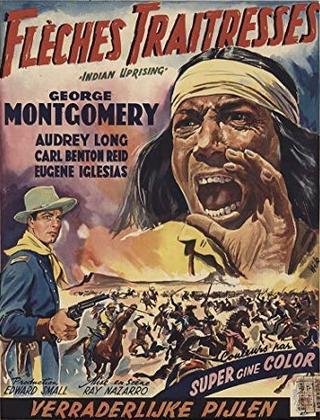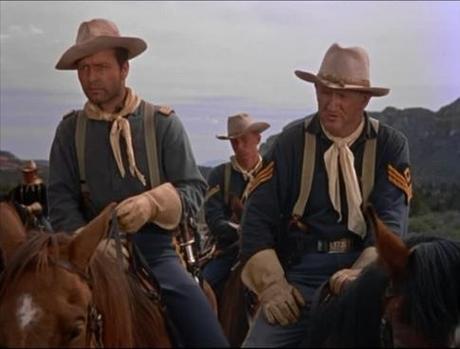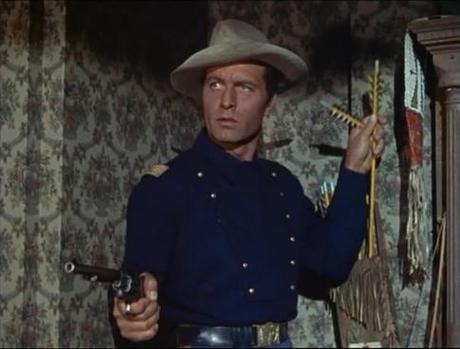
So many things seem to be connected. And once you move into the field of the arts, and particularly cinema, this becomes all the more noticeable. Film fans tend to spend a fair amount of time griping about the latest remake and indeed the fact that more and more of that species seem to be appearing. I can appreciate that; there is that sense of laziness, of creative stagnation, and sometimes the trepidation that accompanies news that some personal favorite is about to be reimagined. Still, it's not a new phenomenon and has been happening for about as long as people have been making movies. All of which brings me to Indian Uprising (1952), a modest yet engaging cavalry western, which is hardly the type you'd think anyone would have been clamoring to redo. Nevertheless, the writing team behind this picture are the same people whose names you will find attached to the very similar , directed by William Witney more than a decade later.
The plot here is a familiar one for anyone who has seen more than a handful of westerns, but that's not to be taken as a criticism since it's the execution of a story that matters more than how high or low it's positioned on the originality scale. It's Arizona in the 1880s and Geronimo (Miguel Inclan) is still free and more than a few steps ahead of General Crook's cavalry. We see events from the perspective of Captain McCloud (George Montgomery), and the opening has his troops luring a band of Apache into an ambush which leads to the capture of Geronimo's son. A valuable captive such as this offers an opportunity to draw the elusive war chief to the negotiating table, and McCloud is both humane and canny enough not to overplay his hand, ultimately setting the boy free to demonstrate good faith. What follows is a process that has often been observed. The Apache strike a deal and keep to it, but other interests are keen to make as much money as possible from the newly tamed territory. As expected, plans are set in motion to stir up latent racial antagonism, political pressure is applied, and the flames of a new conflict are kindled for the sake of a tidy profit.

The later Apache Rifles would focus on a different war chief, Victorio, and add a few other elements to the mix but the essence that film and of Indian Uprising is the question of trust and good faith. These are eternal themes, ones that have resonance in all aspects of human interaction but are especially potent in movies looking at the Indian wars. The message conveyed here is a progressive one but it's realistic enough not to allow its hopefulness blind us to the facts. The integrity and good intentions of the lead remain intact by the end but the ultimate shabbiness of the government line and its dissembling opportunism is confronted squarely and acknowledged, which is to the filmmakers' credit. There are a mix of interiors and location work (including the often used Iverson Ranch and the instantly recognizable red earth of Arizona), with the latter showing director Ray Nazarro's () work off to best effect and also providing a dramatic backdrop for the major action set pieces.
If you take a look around any of the sites that devote time to classic westerns, it's hard to avoid coming across some mention of George Montgomery. I've not featured him here before and the reason for that is down to the simple fact that I've not seen a lot of his films. This is somewhat remiss of me but I have taken steps to remedy that and have acquired a number of his movies - although in my defense, I will say that I've seen and enjoyed a number of episodes Cimarron City, his late-50s TV show. He's a solid and personable lead, his part being a much more straightforward and less complicated one than the corresponding role Audie Murphy would take on in Apache Rifles, and an easy figure for audiences to identify with and root for.

The only woman in the picture is Audrey Long, and Indian Uprising would be her last movie before retiring and settling down to a long marriage to the creator of The Saint Leslie Charteris. She had a relatively brief career anyway although one which included a number of choice films; she played alongside John Wayne in Tall in the Saddle and also was cast in a couple of fine films noir Desperate and Born to Kill. A quick glance at her filmography drew my attention to another of her films I must look out for, Homicide for Three based on Patrick Quentin's novel Puzzle for Puppets. This stood out for me because I'm a mystery fan and also due to the fact not many of Patrick Quentin's Peter Duluth stories have been adapted for the screen, the Lex Barker and Lisa Gastoni vehicle Strange Awakening from Puzzle for Fiends being another example.
Thinking of cavalry movies nearly always brings John Ford to mind. While Indian Uprising is certainly not in the same league as Ford's work, there are a few common factors, quite aside from the general horse soldiers milieu. In the first place, Mexican actor Miguel Inclan appeared in The Fugitive and also, more notably, as Cochise in Fort Apache. One of Ford's trademarks was his portrayal of the various army types and the domestic situation in the isolated outposts. The latter doesn't get an awful lot of attention but, to me anyway, the stage Irish sergeants played by Joe Sawyer and John Call were not such distant relations of those of Victor McLaglen and Ward Bond.
Indian Uprising should be easy enough to locate. There's a MOD DVD available in the US, a French DVD and the Spanish disc I picked up. I think it also turns up online in the usual places but I'm not positive on that. The image generally looks good with natural colors and minimal damage. While this is very much a second tier western it's also an enjoyable one. These kinds of movies were the bread and butter affairs that kept the genre ticking over and are often better than some critics would have you believe. I liked the movie and I feel anyone who appreciates what such programmers have to offer will do so too.
